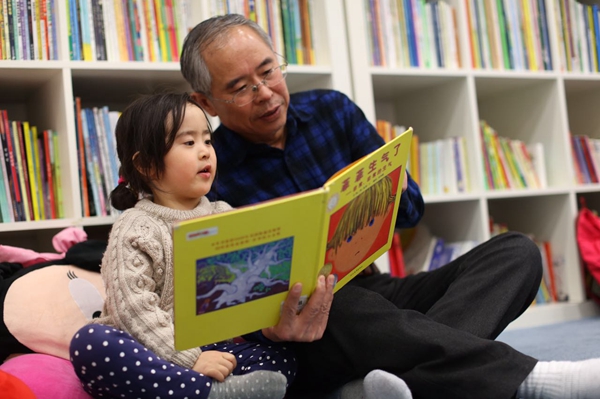 |
|
A grandfather tells stories to his granddaughter at a library in Beijing on the International Children's Book Day, which falls on April 2 every year. [Photo by Wang Jing/Asianewsphoto] |
The importance of reading literature and enjoying this activity often seems lost on many Chinese people. The answers I get from asking about what they read are either that they have no time to read or that they dislike reading. Why do they dislike reading? Their answers are nearly always the same.
"I had to read and study text books every day when I was at school. I don't like reading now."
Even the greatest Chinese philosophers and expert educationalists suggest that the first aim of education is to encourage a love of learning. There is therefore the possibility of something wrong with the way students are taught here.
Why should they read literature? Do stories have value compared with the reading and learning of facts (non-fiction)?
Studies of how children and adults learn show clearly that the most powerful way of learning is by experience; action and doing, experiment and taking risks. Yet there are so many important things to learn that cannot be learned in these ways; emotional response, feelings, problem solving, danger and relationships for example.
Research into this has demonstrated how reading that is rich in sensory detail and emotional and moral complexity is a valuable experience distinctive and different to a decoding of words or a learning of facts. Avid readers of literature show a better understanding of others and can empathies with them and their needs. Their abilities to make good decisions are raised. Young children who enjoy a parent reading stories to them show greater awareness, if not intelligence, when they reach school age.
Literature is an art. Just as calligraphy, poetry and painting are valued by the Chinese, reading literature should surely also be valued and encouraged.
This is often done in China with children at an early age, but once they reach primary school age the emphasis turns to non-fiction in order for students to pass tests. The best schools do seem to provide a limited opportunity to enjoy and investigate literature, usually concerning the Chinese classic stories but there is not enough "free" time and certainly limited time in lessons for students to simply sit and read as they get older. It is not a lack of reading material that is the problem. Chinese bookshops are full of story books.
I cannot read Chinese but I hope the stories are of good quality in terms of content, plot and language. Was there not a Chinese author who received a Nobel Prize or something recently for literature? There are moves in Chinese education to promote decision-making, initiative and shared values. The value of literature contributes to these and should contribute to the future of China.
The original blog is at: http://blog.chinadaily.com.cn/blog-1065966-28452.html